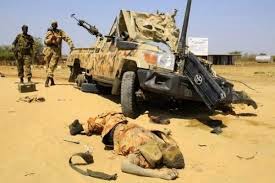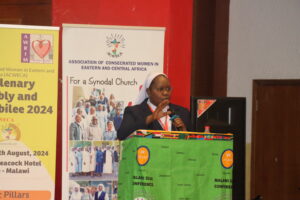SOUTH SUDAN: A Courageous Nun in a Ghost Town – Malakal

“I left Malakal because there were no more people to take
care of. Many had been killed; the rest had fled. Malakal had become a ghost
town with no sign of life” said Sr. Elena Balatti, a Comboni Missionary whoworked
as the Director of radio Saut-al-Mahabbain
Malakal
care of. Many had been killed; the rest had fled. Malakal had become a ghost
town with no sign of life” said Sr. Elena Balatti, a Comboni Missionary whoworked
as the Director of radio Saut-al-Mahabbain
Malakal
“When the war first broke in December 2013, we were five in
our community.Our superior suggested ‘we were free to leave the mission if we
so wished.’ Two of my colleagues left leaving the three of us. I just couldn’t
leave. I felt like part of the community, and I empathized with the weak and
vulnerable; I just wanted to do what I can to assist,” she said.
our community.Our superior suggested ‘we were free to leave the mission if we
so wished.’ Two of my colleagues left leaving the three of us. I just couldn’t
leave. I felt like part of the community, and I empathized with the weak and
vulnerable; I just wanted to do what I can to assist,” she said.
Writing on her diary on the eve of Christmas she said, “The
national army split within Malakal town and the forces loyal to Riek Machar,
former Vice President, managed to overrun the remnant loyal to the Government.
At 6 a.m. the noise of sustained gunfire broke the silence of the morning. At 6
p.m. ululations of exultation and shootings in the air made us to understand
that the rebels were in control. On Christmas day looting of the main markets
ensued unabated until the evening of the 26th December 2013.
national army split within Malakal town and the forces loyal to Riek Machar,
former Vice President, managed to overrun the remnant loyal to the Government.
At 6 a.m. the noise of sustained gunfire broke the silence of the morning. At 6
p.m. ululations of exultation and shootings in the air made us to understand
that the rebels were in control. On Christmas day looting of the main markets
ensued unabated until the evening of the 26th December 2013.
Why Malakal? Why has it been the epicenter of the conflict?
Malakal is a key city in an oil-producing region in the
country’s northeast, so whoever controls Malakal controls South Sudan’s wealth.
country’s northeast, so whoever controls Malakal controls South Sudan’s wealth.
The conflict between the rebels and forces loyal to the
government has devastated the city.
government has devastated the city.
“The corpses of the
rebels were left unburied where they had fallen for days, until the
International Red Cross collected those within the town. Common graves were dug
with an earth moving machine and people were dumped in unceremoniously. The
bodies of the rebels in the outskirts were left to the vultures and the dogs,”
she said.
rebels were left unburied where they had fallen for days, until the
International Red Cross collected those within the town. Common graves were dug
with an earth moving machine and people were dumped in unceremoniously. The
bodies of the rebels in the outskirts were left to the vultures and the dogs,”
she said.
The signing of an agreement for the ‘cessation of
hostilities’ in Addis Ababa notwithstanding, the conflict between the rebels
and the government forces continued to affect ordinary people, where killing
and looting became the order of the day.
hostilities’ in Addis Ababa notwithstanding, the conflict between the rebels
and the government forces continued to affect ordinary people, where killing
and looting became the order of the day.
The rebels did not seem to care or respect even the most
sacred places where ordinary innocent civilians had gone to seek refuge. The
cathedral was not spared and so was the nuns’ residence. They took everything
of value and destroyed anything they deemed valueless.
sacred places where ordinary innocent civilians had gone to seek refuge. The
cathedral was not spared and so was the nuns’ residence. They took everything
of value and destroyed anything they deemed valueless.
“On 18th February at around 6:45 a.m. the parish
priest of the cathedral phoned to inform me that he was leaving with another
priest and the Bishop Emeritus, Msgr. Vincent Mojwok,” Sr. Ballati remembered.
priest of the cathedral phoned to inform me that he was leaving with another
priest and the Bishop Emeritus, Msgr. Vincent Mojwok,” Sr. Ballati remembered.
“What are you going to do,” the bishop asked. “We are going
to stay on as there were still people sheltering inside the compound,” Sr. Balatti.
The two priests and the bishop emeritus did not make it by the car, they had to
escape on foot; through a swamp where the two priests had to help the bishop
emeritus wade through the murky water to cross over to safety.
to stay on as there were still people sheltering inside the compound,” Sr. Balatti.
The two priests and the bishop emeritus did not make it by the car, they had to
escape on foot; through a swamp where the two priests had to help the bishop
emeritus wade through the murky water to cross over to safety.
Eventually Sr. Balatti and her companions left Malakal which
had become a ghost town without people, without domestic animals. Vultures and
dogs were feeding on corpses littering the streets. Groups of rebel soldiers
were the only ones moving around.
had become a ghost town without people, without domestic animals. Vultures and
dogs were feeding on corpses littering the streets. Groups of rebel soldiers
were the only ones moving around.
“The last images I had from Malakal while heading to the
UNMISS aircraft bound to Juba were the corpse of a woman who appeared to have
been gang raped and the smoke of the villages set on fire on the Western bank
of the Nile.
UNMISS aircraft bound to Juba were the corpse of a woman who appeared to have
been gang raped and the smoke of the villages set on fire on the Western bank
of the Nile.


